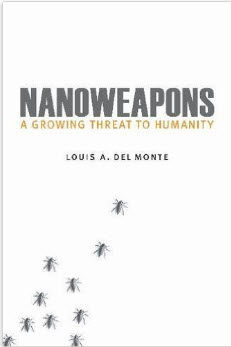USAF Major Andrew Martin’s staff assistant, Master Sergeant Beesly, interrupted via Martin’s earpiece, “There a call from your wife, Major. It’s urgent.”
Martin was coordinating the drone missions for the week with the three captains under his command by using the Nellis Air Force Base secure intranet. Martin and the captains could each see one another on their respective computer monitors.
“One moment.” Martin pushed a button on his computer keyboard, and his monitor went blank. It was highly unusual for Andrea to call him at work. Normally, a call from outside the base would not be put through unless there was an emergency. Martin’s adrenaline level increased as he tapped his earpiece.
“Hi honey…is everything okay?”
Andrea, his wife of thirteen years, was sobbing. “My Dad just had a stroke.”
“When… How bad?” His tone was caring and calm.
“I just got a call from my Mom. He was at his dental practice and collapsed.” Andrea was sobbing and could hardly speak but managed to say, “They rushed him to Valley Hospital Medical Center. My Mom is with him now.”
Although Andrea’s parents lived in Boulder City, a plush suburb of Las Vegas, her father, Doctor Joseph Benson, had his highly lucrative dental practice in Las Vegas. Thanks to Las Vegas’ thriving economy, Valley Hospital Medical Center had an excellent Stroke Center, which was widely respected for its team-based approach to comprehensive stroke care.
At least Joe’s in the right place, thought Martin. Trying to remain calm for Andrea’s sake, he said, “I’ll be right home.”
“Please hurry.”
Martin pushed a button on his computer keyboard, and the monitor screens lit up. “Sorry, captains, for the interruption… I think we were just about done. Any questions?”
No one asked a question, so he continued, “Captain Struthers, I’m leaving you in charge. I have a family emergency. Call me if we get new orders or if the orbits encounter issues.”
“Yes, sir,” Struthers replied.
Martin pushed a button on his computer keyboard, and the meeting ended. Then, he tapped his earpiece. “Sergeant Beesly route my car to the entrance.”
“Yes, sir.”
Martin spent the next minute shutting down his computer and placing his papers in his office’s “Top Secret” secure file cabinet, which only opened when he placed his right hand on its biometric reader and gave it a voice command. The base commander, General Robert Rodney, if necessary, could also open it.
Beesly’s voice came through Martin’s earpiece. “Your vehicle is at the entrance, Major.”
“Thank you, Sergeant… Please inform General Rodney of the situation. Let him know that I left Captain Struthers in charge during my absence.
“Yes, sir.”
Martin took the stairs, not wanting to wait for the elevator. His office was on the second floor, and the physically fit Martin was at the entrance within a moment. He got into the back seat of his new driverless vehicle and commanded, “Take me home.”
“Yes, sir,” said the synthetic voice of the vehicle’s SAM (strong artificial machine).
In 2030, driverless vehicles were popular and amazingly accounted for about 50% of all new vehicles sold. It was normal to pay 25% more for the driverless option, but Martin was assigned his vehicle via the officer’s compensation plan for his rank. The USAF and other military branches favored purchasing driverless vehicles ever since their widespread introduction in 2026. Their safety record appeared on par, if not better than their human-driven counterparts, eliminating the need to assign a driver.
The Martins lived in Centennial Hills, about three miles east of Nellis. Within five minutes, his vehicle pulled into the garage of their four-bedroom, two-story home. He noticed his wife’s car was already in the garage, which meant she was home. He bolted from his car and into the kitchen. His wife was talking on the phone. She quickly ended the conversation as soon as she saw her husband.
Andrea’s soft brown eyes were blood red. She turned to look at her husband, “I called the school to let them know I would be out today and tomorrow.” She was a high-school chemistry teacher at Advanced Technologies Academy, a public high school in Las Vegas, focusing on integrating technology with academics for students in grades 9-12. It was approximately fourteen miles from their home, which worked out to about a 22-minute drive.
“He’s in good hands.” Martin’s voice was reassuring, and his wife nodded in agreement. Instinctively, they embraced.
Martin liked Joe. Joe was tall, with light gray temples. His appearance conferred an aura of confidence. Joe, like Martin, was both reserved and a man of few words. He had the uncanny ability to get along with almost anyone. He was well-read and one of the few people who understood the true nature of Martin’s combat role and the stress that accompanied it. Like Andrea, Joe’s wife, Mildred, was also a chemistry teacher at Advanced Technologies Academy. The Benson’s had two daughters, Elise and Andrea. Elise lived in Minnetonka, Minnesota, with her husband, Mark, and was one year younger than Andrea. Elise was four months pregnant. Mark was an electrical engineer working for Honeywell.
Andrea looked up at her husband and spoke softly. “Let’s go…” He nodded, and they both walked to the garage and got into the back seat of Martin’s vehicle.
Martin gave a voice command. “Dive us to Valley Hospital Medical Center.”
“Yes, sir,” replied the vehicle’s synthetic voice.
Andy held his wife’s hand as the driverless vehicle drove the 15 miles to the Medical Center entrance. When they arrived, the car doors opened automatically. They got out; an automated machine provided a parking receipt, and the car proceeded to park itself in the adjacent ramp. With that, the Martins headed to the information booth, just inside the entrance. They learned that Joe was still in the ER, treatment room 12. They walked through the emergency facility maze of corridors and finally found treatment room 12. The curtain blocked their view, and they could hear voices. Andrea pulled back the curtain to look in and saw a person in a white smock talking to her Mom. Andrea took he husband’s hand, and they both walked into the treatment room.
The man in the white smock turned to see them enter. “Hello, I’m Doctor Jacob, a stroke specialist.” Doctor Jacob appeared to be a man of average height and build in his mid-forties, with slightly gray temples complementing dark brown hair. They shook hands.
Andrea’s soft brown eyes stared with worry at her Dad, lying almost flat in bed. A clip-on Joe’s left-hand middle finger was attached to a monitor, which provided oxygen and pulse readings. Andrea’s Mom was standing on the far side of the bed next to her Dad. Andrea went over to her Mom, hugged her, and then softly touched her Dad’s hand.
“How’s my Dad?” Andrea’s voice held back tears as she looked at Doctor Jacob.
Doctor Jacob looked at her and, with self-assured confidence, said, “He had a minor stroke. He lost feeling in his right leg, which caused him to fall.” He paused while looking at his tablet phone. “His right leg is still numb, but some of the stroke symptoms have receded. I’ll know more after the tests.”
“What kind of tests?”
“We’ll start with an MRI and go from there.”
Doctor Jacob looked down at his tablet phone and then looked again at both Andrea and her Mother. “The MRI will tell us if the stroke is ischemic, a blockage, or hemorrhagic, blood leaking from an artery in the brain.” He paused. “We’ll be wheeling him out shortly.”
Doctor Jacob looked at Joe. “Don’t worry, Mr. Benson. We’re going to take good care of you.”
As the doctor finished his last few words, an orderly came to wheel Joe into the MRI room. Andrea and Mildred kissed Joe, and the orderly wheeled him out of the room.
Doctor Jacob addressed the family, “He should be back in less than an hour. I’ll also be back right after I have a chance to review the MRI images.” He could sense the level of concern on their faces. “It looks like a mild stroke. We’ll take care of him,” he offered to assuage their fears.
Doctor Jacob left the room. Martin went over and put his arm around Mildred, who, for the most part, looked like Andrea’s older sister, not her mother. He spoke calmly while looking into Mildred’s brown eyes. “He’s in the best place possible.”
Mildred looked up, “Thank you both for coming….” Her eyes began to tear. Martin instinctively hugged her again. Mildred, like Andrea, was a strong, self-assured woman. Given the situation, Mildred displayed amazing self-control.
Martin looked at both Andrea and Mildred. “I’ll be right back.” He was gone for only a few minutes and returned with a pager. “They’ll page us when Joe is back in the room. The nurse said we could wait in the visitor’s lounge just down the hall.”
Together they walked to the visitor lounge. Its walls were gray, and there was a large brown leather couch and several matching chairs. In the corner was a television. It was broadcasting CNN with closed captioning. Andrea and her Mom sat on the couch, and Martin sat in a chair facing them. Andrea reassuringly held her Mother’s hand. While the hour dragged on, they made small talk, mostly focused on the ideal golf weather. Then the pager buzzed and lit up.
Martin, startled by the pager, composed himself and said, “Looks like Joe is back in his room.”
They got up and walked back to treatment room 12. The Doctor was talking to Joe. As they entered, the Doctor greeted them again.
“It’s mostly good news,” Doctor Jacob said in an upbeat tone. “It was an ischemic stroke, affecting only a small portion of the brain. There is some dead brain tissue…” He paused so that they had time to process the information.” We’ve given Mr. Benson a tPA… tissue plasminogen activator…a clot-busting drug that is dissolving the clot as we speak.”
Mildred looked at Doctor Jacob. “What about his leg?”
“We’ll need to do a neuroprosthetic brain implant to restore his leg function.”
Neuroprosthetic brain implants were not new. Early research on them started in 2008 at the Washington University School of Medicine in St. Louis. Brain-computer interfaces (BCI) were used to detect signals on one side of the brain linked to hand and arm movements on the same side of the body. These signals could be detected and separated from signals that controlled the opposite side of the body. This made it possible to implant a BCI in the undamaged side of Joe’s brain and restore function to his leg. In addition to the BCI, a small wireless computer would be implanted in Joe’s chest (just below the collarbone). The purpose of the computer was to interpret signals from the BCI and assure they resulted in the proper leg movement. This type of surgery was routine, and the patient usually went home the next day.
Doctor Jacob looked at Joe. “Don’t worry, Joe. You’ll be walking out of here tomorrow on your own.”
Relieved, Joe flashed his radiant smile, putting his wife and daughter instantly at ease. “Thank you, Doctor,” he said in a soft relieved tone.
“We’re going to prescribe a Coumadin regiment to prevent new clots from forming, but we’ll talk more about that tomorrow before you leave the hospital.”
Joe nodded. Everyone felt greatly relieved.
“We’ll be prepping you for surgery as soon as you sign the release form.” Doctor Jacob held his tablet phone in front of Joe, and Joe signed his name using his finger.
“They will be down shortly to take you to surgery. The whole procedure will take about three hours.” He paused as he looked at Joe’s signature on the tablet phone. “Doctor Harris will operate… He’s one of the best in the country.”
Doctor Jacob looked up from his tablet phone and asked, “Any questions…?”
Mildred replied, “No, I think we understand….”
“Good. You can get something to eat in our cafeteria if you’d like. I’ll call you as soon as Joe is out of recovery and in his room.” Doctor Jacob asked Martin to transfer his phone number to him electronically. Martin readily complied.
“If there are no questions, I’ll leave you for now. If anything comes up, I’ll call you.”
Mildred and the Martins nodded. Doctor Jacob smiled and left.
Mildred and the Martins made their way to the cafeteria and had a light lunch. After lunch, they went to the visitor’s lounge in the hospital’s lobby. Andrea called her sister Elise and gave her a full update. The lounge’s computer monitor provided updates on Joe’s progress. The hours passed, and Martin finally received a call from Doctor Jacob.
“All went well,” said Jacob in a calm, assuring tone. “Joe is in room 43B. He’s sitting in a chair and eating. You can visit him now.”
Mildred and the Martins made their way to Joe’s room. His bed was nearest the window. He was sitting in a large leather recliner chair. His food tray was on a stand that held the tray just above his waist.
Mildred walked over to him. “How are you, dear?”
“I feel fine. Even my right leg feels fine. I walked to the chair on my own.”
Martin marveled at the level of technology. Twenty years ago, Joe would likely require months of physical therapy and then probably need a cane to walk. Yet, here he is, almost back to normal. Only a small bandage covered the top right side of Joe’s head. His hospital gown hid the chest bandages. Several wires we attached to Joe’s chest under his gown, and he had a plastic finger clip, all of which displayed his vitals on a nearby monitor.
Mildred and the Martins visited for a while but wanted to leave early to let Joe rest. Before they left, Andrea called her sister and gave the phone to her Dad. Elise talked to her Dad for a few moments.
The next day Mildred and the Martins returned to take Joe home. He was able to walk normally. Doctor Jacob told them that Joe should make an appointment with Doctor Harris in a week to have a post-op checkup and the stitches removed. Until then, Joe was to remain home and rest. He emphasized that there should be no exertion.
In a week, the bandages and stitches were removed. In a month, Joe was back at his dental practice, fully recovered. The Bensons and Martins returned to their normal routine.
Note to readers: Hit the like button if you want me to provide similar scenarios in future posts.











